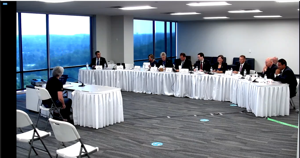Redistrict based on shared interests, not power, Pittsburgh residents ask

(The Center Square) – Residents in Pittsburgh and surrounding suburbs said they want lawmakers to group them into congressional districts with common interests and not just a high probability of reelecting incumbent candidates.
The comments came during the House State Government Committee’s regional redistricting hearing in Bridgeville, where testifiers – one after another – disparaged the now-defunct 2011 map that is still considered one of the worst cases of gerrymandering in the country, warning lawmakers against repeating history.
In 2011, critics argued that Republicans – who, at the time, controlled both chambers of the Legislature and the executive office – gerrymandered maps to cement their power, resulting in bizarre and nonsensical district borders.
The state Supreme Court tossed the maps in 2018 and imposed its own boundaries. The redrawn districts flipped a 13-5 Republican majority to a 9-9 even split.
“It’s ridiculous, just utterly ridiculous,” said Hill Jordan, a Pittsburgh resident. “It [shouldn’t be] … I’m Republican so I’m going to carve up this crazy district here or I’m Democrat so I’m going steal this area over here to get what I want in the Legislature.”
“It’s absurd and it’s shameful,” he said as lawmakers on the committee laughed in agreement. “We chuckle, but let’s do something about it.”
Bridgeville sits in the state’s 18th congressional district, which encompasses the city of Pittsburgh and its suburbs in southern Allegheny County. The latest population data gleaned from the U.S. Census Bureau means that Pennsylvania will lose its 18th seat, though it’s still unclear how lawmakers will reshape representation in the region.
The new map, drawn by legislators and approved in both chambers, must also win support from Gov. Tom Wolf – and they hope to accomplish it all before the 2022 primary elections next spring.
So, to avoid mistakes of the past, Committee Chairman Seth Grove, R-York, announced a slate of hearings to collect input from the public about what the new districts should look like. The House also launched a website to collect public comments.
Wednesday’s hearing focused on what residents in the diverse and contested Pittsburgh region want to see.
For Hill, it’s imperative that lawmakers keep the city of Pittsburgh intact as a district. Splitting it will disenfranchise Black voters, he said.
“In order to improve things for African American voters, it’s important the our boundaries not be gerrymandered or chiseled,” he said.
Pennsylvania demographic trends over the last decade, according to federal data, show populations in the northern tier and other rural counties have declined, while cities and their outlying suburbs have grown.
Pennsylvania’s 13 million residents also became more racially diverse than ever before, with people of color accounting for 23% of the population overall.
Gabriel Johnson, a resident of Pittsburgh’s 6th Ward, told lawmakers that keeping like-minded voters together – such as those who reside in the city, some of its eastern and northern suburbs and a region considered Mon Valley that runs south along the Monongahela River – will do just that.
“They have the vast majority of Black voters in Pittsburgh,” he said. “Don’t cut those off into another district.”
For Tim Campbell, a physician and municipal councilman in the southwestern suburb of Bethel Park, being lumped into the 18th district with Pittsburgh means the issues impacting his community “have been swallowed by the city’s needs, which are different and vast.”
“It’s not about race,” he said. “It’s not about socioeconomics. It’s not about exclusivity. It’s not about politics. It is about representation … [and] having a representative represent the citizens’ desires and interests.”
Johnson argued that demographics do in fact play a key role in the shared interests of a community. Those who disagree with that, he said, belong in a separate district.
“These are, of course, key points in representation, and I think that if those views are commonly shared by those in the 17th district, it shows they should be in a different district than those of us in the city and the Mon Valley,” he said.
The committee’s regional hearings continue Thursday at the State Theater Center for the Arts in Uniontown, where lawmakers will collect testimony from residents of the 13th and 14th congressional district that encompass Beaver, Washington, Greene, Fayette, Westmoreland, Indiana, Somerset, Cambria, Blair, Bedford, Huntingdon and Fulton counties.
Disclaimer: This content is distributed by The Center Square
